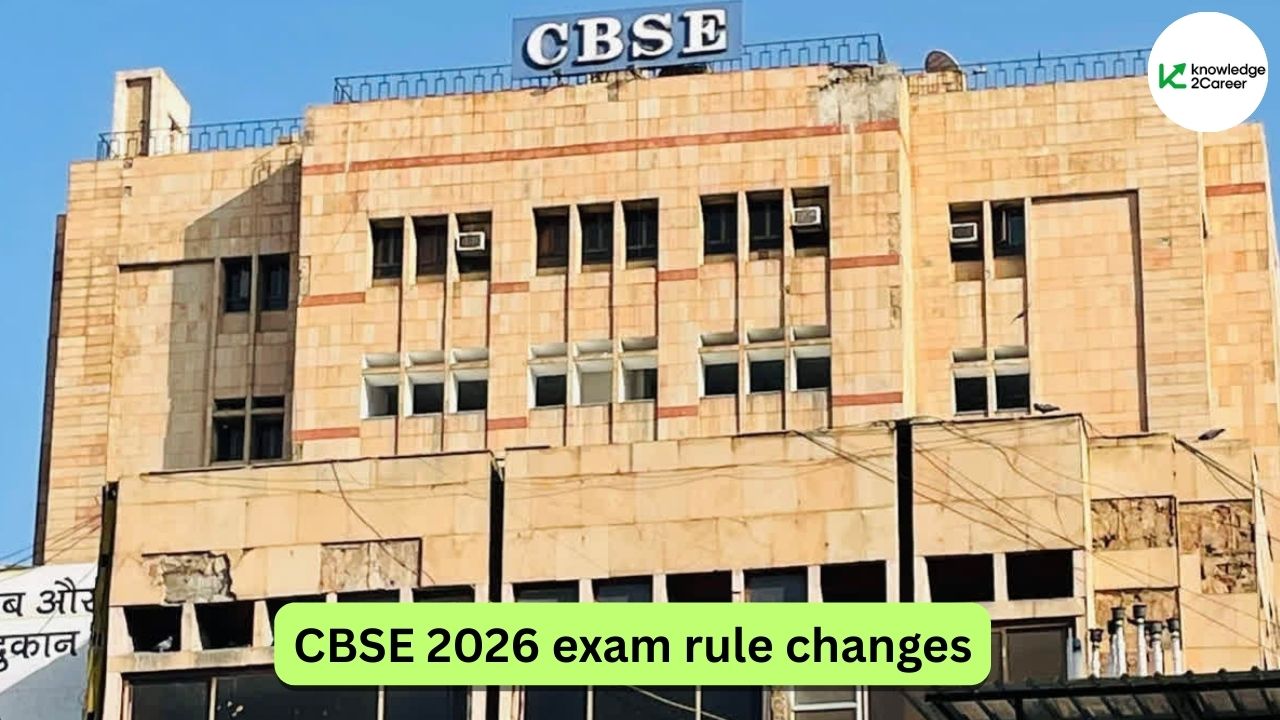The Central Board of Secondary Education (CBSE) has announced major CBSE 2026 exam rule changes that will reshape the way board examinations are conducted. These updates, aligned with the National Education Policy (NEP) 2020, are designed to make the system more flexible, reduce stress, and ensure academic integrity. From minimum attendance requirements to a two-exam window system, the changes will significantly impact students, teachers, and parents alike.
This article breaks down every detail you need to know about the new CBSE 2026 exam rules.
Table of Contents
Key Highlights of CBSE 2026 Exam Rules
| Rule/Change | Details |
|---|---|
| Minimum Attendance | 75% mandatory attendance for Classes 10 & 12 |
| Two-Year Study Rule | Students must complete at least two years of study before appearing for board exams |
| Exams Windows | Two board exam opportunities – February (Main) and May (Improvement/Compartment) |
| Internal Assessments | Compulsory, held once before February exams |
| Registration | Strict rules via Pariksha Sangam portal; no late entries |
| Result Declaration | February exam results in April, May exam results in June |
| Certificates | Final marksheet issued in June, based on best performance |

What’s New in CBSE 2026 Exam Pattern
Two Board Exam Windows Per Year
One of the most significant changes is the introduction of two exam windows for Class 10 and 12 students.
- Main Exam: Conducted in mid-February.
- Second Exam: Conducted in May – serves as both an improvement exam and a compartment exam for failed subjects.
This system ensures that students are not judged solely on one performance, reducing the high-stakes pressure of a single exam.
Full Syllabus in Both Exams
Both the February and May exams will cover the entire syllabus of the academic year. The exam pattern and marking scheme will remain the same in both sessions.
This ensures consistency while still offering flexibility for improvement.
CBSE 2026 Results and Internal Assessments
Result Timelines
- February Exam Results: Announced in April
- May Exam Results: Announced in June
Internal Assessments
- Internal assessments (projects, practicals, and assignments) will be held only once before the February exams.
- Marks from internal assessments will be valid for both exam sessions.
Read More: Nestlé Virtual Internship 2025 | Free Internship with Certificate, Skills & Rewards
Read More: Samsung Electromechanics Internship 2025 – Human Resources Paid Internship | Apply Now
Eligibility for the Second Exam
Not every student needs to appear for the May exam. The second attempt is optional and designed for specific cases:
| Category | Eligibility for May Exam |
|---|---|
| Improvement | Students who passed in February but want to improve scores (up to three subjects) |
| Compartment | Students who failed in one or two subjects in February |
| Special Cases | Students who missed exams due to medical reasons, sports participation, or winter-region schools |
Important Note:
- Students failing in three or more subjects in February will be marked as “Essential Repeat” and must reappear the next academic year.
Implications of New CBSE Exam Rules
For Students
- Reduced stress with two opportunities to improve marks.
- Freedom to skip May exams if satisfied with February results.
- A more balanced approach toward learning instead of last-minute cramming.
For Teachers
- Need to adjust lesson plans for year-round learning.
- Must guide students on whether to reappear in May.
- Increased focus on continuous assessments and student progress.
For Parents
- Shift from exam-result pressure to supporting continuous growth.
- Active role in helping children make informed decisions about improvement attempts.
Read More: ZOHO Corp Off Campus Drive 2025: Apply for SOC Analyst Role | Freshers Hiring
Read More: Azim Premji Scholarship 2025 – ₹30,000 for Female Students
Rules for Registration, Results, and Certificates
- Registration (LOC): Schools must correctly submit the List of Candidates (LOC) for February exams. No additions will be allowed later.
- Final Certificates:
- The final mark sheet and passing certificate will be issued only after June.
- Students’ best performance across the two exams will be considered.
- Performance Document: After February exams, a digital performance report will be available on DigiLocker, enabling Class XI admissions for students who do not wish to retake exams.
Challenges in Implementation
While the new rules aim to reduce stress, they also bring new challenges:
- Academic Pressure Throughout the Year: Students must prepare for February while also keeping options open for May.
- Administrative Readiness: Schools must update systems, conduct timely internal assessments, and ensure accurate data entry.
- Student Decision-Making: Choosing whether to stick with February results or reappear in May requires proper guidance.
- Balancing Flexibility and Rigor: Authorities must ensure that reduced stress does not compromise academic standards.
Read More: What is APAAR ID? 2025 Student Guide to This Game-Changing & Essential Education ID
CBSE 2026: Balancing Flexibility with Academic Integrity
The CBSE 2026 exam rules mark a turning point in India’s education system. By replacing the one-shot annual exam with a two-window approach, the system empowers students, reduces exam anxiety, and promotes lifelong learning.
However, the real success of these changes will depend on how well students, teachers, and parents adapt to the new system. Proper planning, timely assessments, and informed decision-making will be the key to making the most of this flexible yet rigorous structure.
Frequently Asked Questions (FAQs) – CBSE 2026 Exam Rules
Q1. What are the new CBSE 2026 exam rules?
The new CBSE 2026 exam rules include mandatory 75% attendance, two board exam windows (February and May), compulsory internal assessments, strict registration via the Pariksha Sangam portal, and a two-year study requirement for Classes 10 and 12.
Q2. Will CBSE conduct board exams twice a year from 2026?
Yes, starting from the academic year 2025–26, CBSE will hold two board exams annually. The February exam will be the main exam, while the May exam will act as an improvement and compartment opportunity.
Q3. Is the second CBSE exam in May compulsory?
No, the May exam is optional. Students can appear only if they want to improve their marks, need to clear compartment exams, or fall under special categories such as sports participants or students in winter-bound schools.
Q4. Will the CBSE 2026 exams cover the full syllabus?
Yes, both the February and May board exams will cover the entire year’s syllabus with the same exam pattern and marking scheme.
Q5. How will CBSE issue final results and certificates?
The final marksheet and passing certificate will be released after the June results, based on the student’s best performance across the two exams. A performance document after February exams will also be available on DigiLocker.
Q6. What happens if a student fails in three or more subjects in the February exam?
Students failing in three or more subjects in the February exam will be marked as “Essential Repeat” and will not be allowed to sit for the May exam. They must reappear the next academic year.
Q7. How will internal assessments be conducted under the new rules?
Internal assessments such as projects, practicals, and assignments will be held once before the February exam. The marks will remain valid for both exam attempts.




